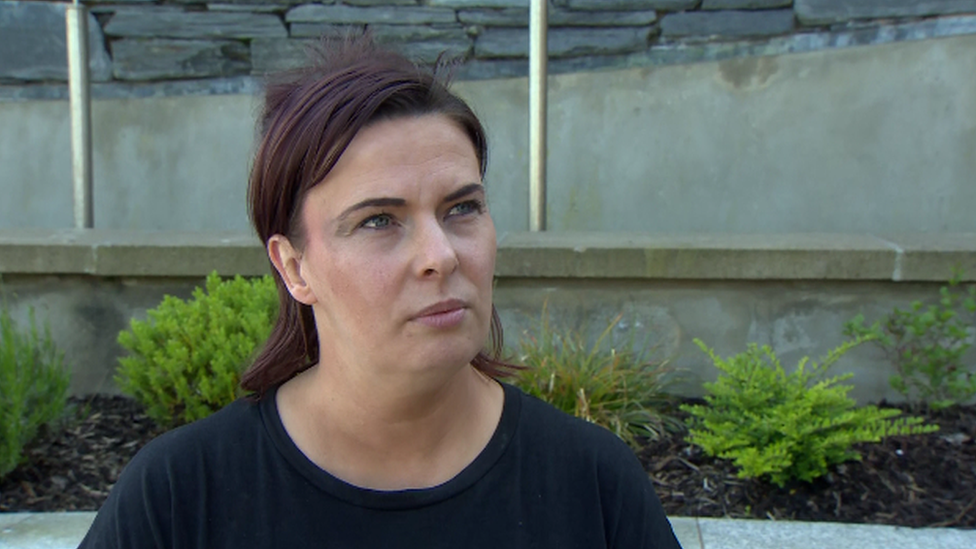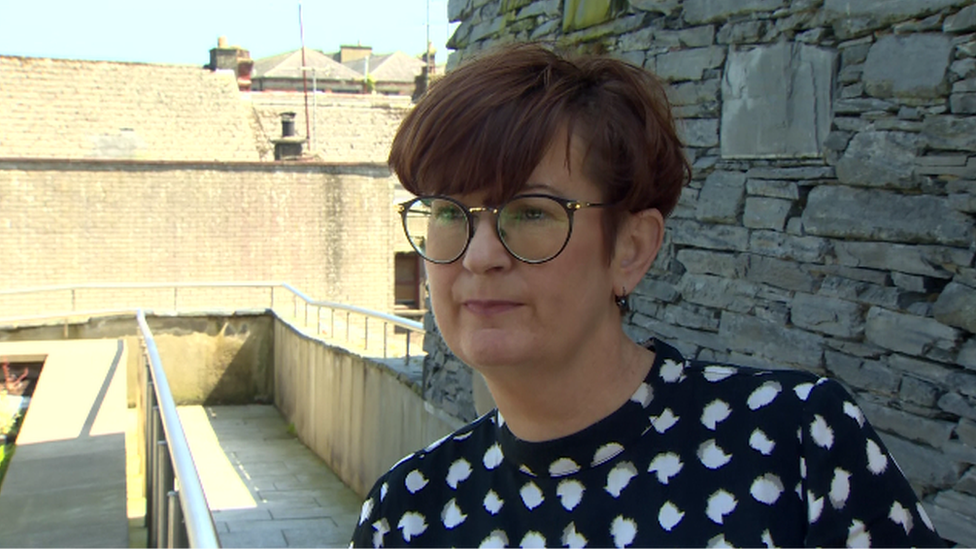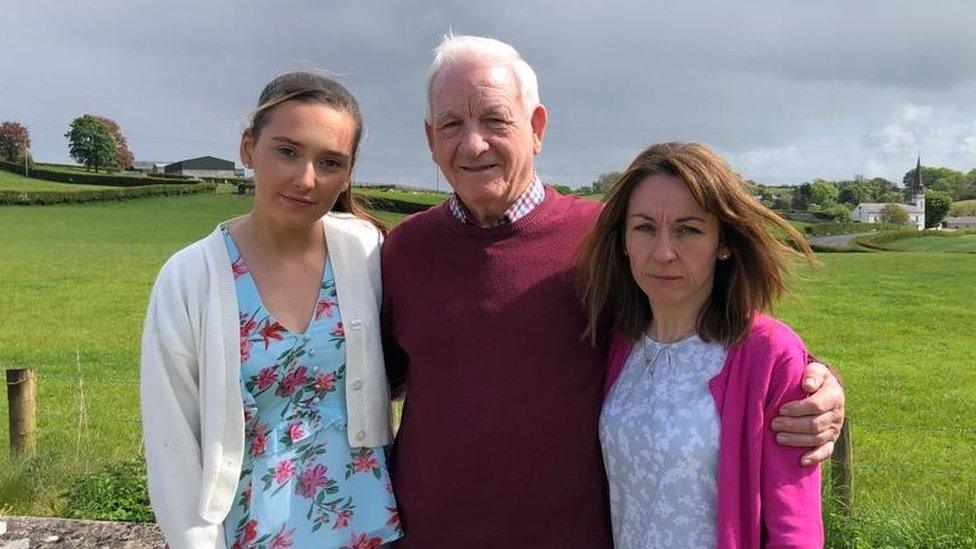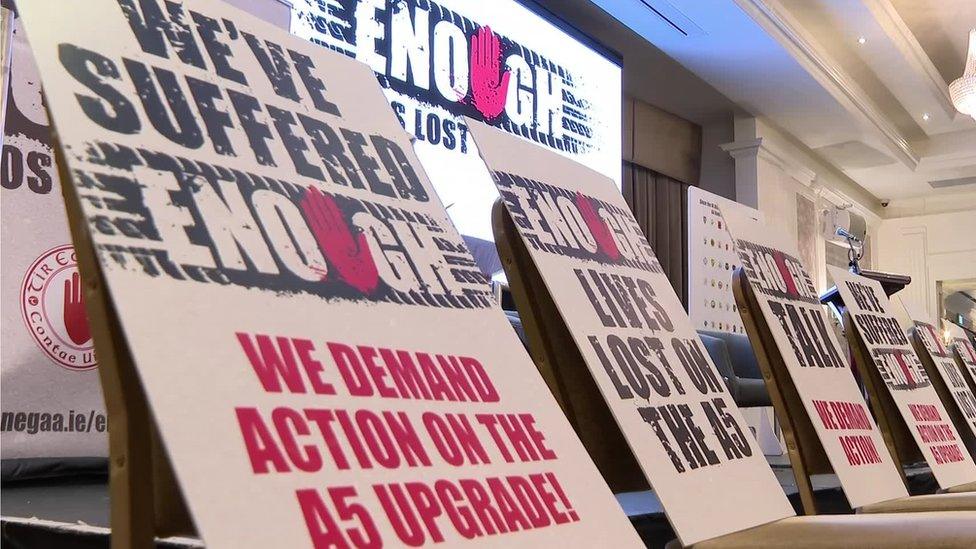A5 campaign group 'will not tolerate more road deaths'
- Published

Campaigners held a demonstration outside the Strule Arts Centre in Omagh where the public inquiry into the A5 is being held
A group campaigning to upgrade the A5 dual carriageway has told a public inquiry it will not tolerate burying any more road crash victims.
Niall McKenna, chairperson of the A5 Enough is Enough group, said the upgrade needed to happen.
Those supporting a new road said the existing one between Londonderry and Aughnacloy is the most dangerous across the island of Ireland.
More than 50 people have been killed on the route since 2006.
A Planning Appeals Public Inquiry is sitting for a second week in Omagh, County Tyrone.
It is examining proposals for a new dual carriageway along the A5 route, a project which has been beset with funding issues and legal challenges.
Mr McKenna said that statistics from the Department of Infrastructure indicated that more than 10% of fatalities on Northern Ireland's roads were associated with accidents on the A5.
"This is a quite staggering statistic, as is the fact that the accident record and the number of fatalities on the A5 is increasing at a time when the general trend on all roads in Northern Ireland is one of reducing accidents and fatalities," he said.
'100% avoidable'
An A5 upgrade would be the single largest road scheme ever undertaken in Northern Ireland, involving 85km (53 miles) of new trunk road, with the most recent cost estimate given as £1.6bn.
On Tuesday, the inquiry heard from relatives of people killed in crashes on the A5.
Julia McSorley died on the road in April along with her nephew Dan McKane and niece Christine McKane - her goddaughter Theresa Finlay said the upgrade needed to happen as the road is unsafe.

Theresa Finlay lost her godmother Julia McSorley on the A5 road in April
"I don't want to be on the edge of anyone else's bed and see another fatality, a RTC (road traffic collision) that is 100% avoidable if our roads were made fit for purpose," she said.
Geraldine O'Neill, whose brother Shane was killed on the A5 in March 2008, lives on the route where the upgrade would be built and said she would not stand in its way.
"We have two young girls who drive the A5 every day, they travel to Belfast for university and the danger that they put themselves in just trying to get out of the entrance at the top of the property," she said.
"Every family in the area has the exact same problem, it is just such a treacherous road."

Geraldine O'Neill lives on the route where the new A5 road would be built
Mr McKenna, from the Enough is Enough group, added that in contrast to the A5, the A4 road between Ballygawley and Dungannon in County Tyrone was upgraded to dual carriageway in 2010 and has since seen a significant reduction in accident rates.
"The old A4 was equally as treacherous as the A5 and since it was dualled, there has been a 97% reduction in road deaths," he said.
"In terms of safety and traffic progression, it is clear that the old road falls well short of the new A4 dual carriageway which has an excellent safety record and is something that we should aspire to for the A5."
Work 'needs to move on'
Earlier, Sinn Fein's Conor Murphy, who approved the upgrade in 2007 as regional development minister, said the delay was "hugely frustrating".
"Over this period of time we have had multiple deaths on this road when this road should have been built," Mr Murphy said.
"Contracts were signed 16 years ago and it is very frustrating that we're still discussing beginning work.
"It needs to move on, it needs to be moved on quickly."
The proposal to upgrade the road has faced opposition, including from the campaign group Alternative A5 Alliance.
The group - made up of farmers, landowners and others with an interest in the County Tyrone area - has said A5 improvement has long been needed but that it opposes the compulsory purchase of land to construct the road.
It has also raised environmental issues about the project.
The inquiry is examining the justification for the scheme, including road safety, north-south links and journey times; an economic appraisal including funding of the scheme; and alternatives to the dual carriageway.
- Published15 May 2023

- Published10 May 2023
